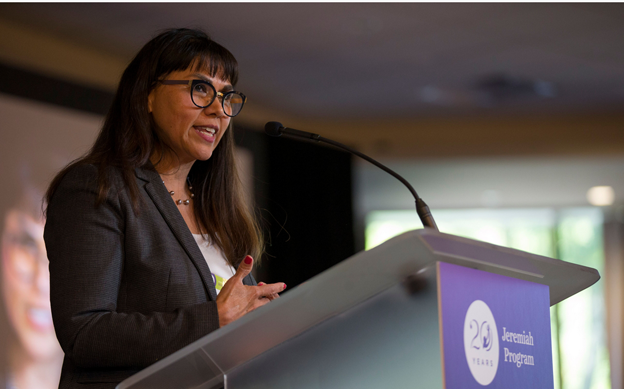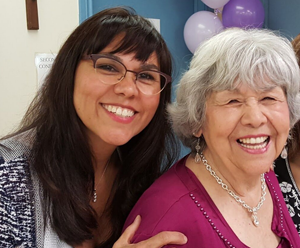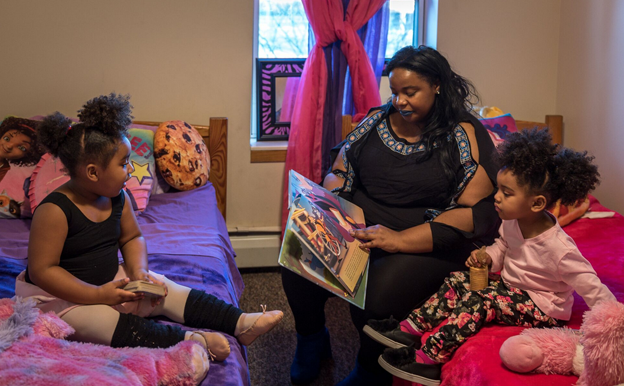On a Mission to Create Paths Out of Poverty for Single Mothers
March 07, 2019

By Julie Bos, ECMC Foundation Contributing Writer
This story originally appeared in the ECMC Foundation 2018 Annual Report.
Gloria Perez, CEO of Jeremiah Program (Jeremiah) understands the struggles and obstacles that single mothers face.
She was in fifth grade when her father died from cancer at age 46. Suddenly widowed, Gloria’s mom was left to raise Gloria and her two older sisters on her own. Feeling isolated and alone, she did her best to support her family. She worked as a secretary for the Air Force to make ends meet, but dreamt of getting a college degree to improve her financial situation.
Eventually, her mother’s educational journey began. Gloria recalls going with her mom to the community college every night and doing her homework or sleeping in the library because they couldn’t afford a babysitter.
"Like many adult students, she earned credits, but never completed her associate degree because barriers got in the way," said Gloria.
Managing school and full-time work posed its own challenges, but things got too tough when Gloria’s sisters started having trouble in school. Gloria’s mom had to take a break from college, and to her mom’s own regret, she never finished.

Gloria Perez and her mom
It’s a plight that’s all too common. According to the Institute of Women’s Policy Research (IWPR), only 8% of single mothers who enroll in college will graduate with an associate or bachelor’s degree within six years, compared to 54% of married mothers and 40% of women overall.
In most cases, single mothers enrolled in postsecondary programs juggle classes, homework, child care, work, finances and running a household—all by themselves. Even the smallest of unexpected obstacles can push these students to the sidelines.
Jeremiah’s founder, Michael J. O’Connell, was a Catholic priest who recognized the barriers facing single mothers pursuing education and saw a gap in programming. There were employment programs, early childhood programs and even career development programs, but nothing was holistic. So, he created a new program that addressed the many barriers faced by single moms.
"He used to say, ’If we get this right, people will want to replicate this program,’" said Gloria.
Twenty years ago, Father O’Connell asked Gloria to join as the program’s CEO.
"What attracted me to Jeremiah Program initially was their commitment to work with women who are ready to take action to change," she shared. "I wanted to help make that change through education and the target population [single moms] reminded me of my own mother."
Funding to Move Progress Forward and Help More Single Moms
With funding from ECMC Foundation and others, Jeremiah is on the fast-track to making postsecondary success more attainable for single mothers.
Working nationally, Jeremiah offers two-generation anti-poverty solutions for families headed by single mothers. The organization works with single mothers living below the poverty line and their young children to improve access to postsecondary education and reduce barriers to success for both generations.
Jeremiah’s proven holistic program model includes five fundamental services: coaching for career-track college education, empowerment and life skills training, quality early childhood education, safe affordable housing and supportive community.
Jeremiah’s efforts are working. A 2016 survey of 30 Jeremiah alumnae showed that 100% of graduates are living in safe housing and 91% are employed or continuing their education. With an average annual income of $47,609, the majority of graduates have moved above the federal poverty line. The next goal is expansion.
Funding from ECMC Foundation supports Jeremiah’s capacity-building efforts in its next phase of growth. First, Jeremiah is gathering market research to identify the opportunities for high-demand jobs in all Jeremiah’s existing communities. It is also conducting focus groups to inform a future pilot that will test a shorter-term career pathway model in Rochester, Minnesota. This short-term education pathway is in addition to the work that Jeremiah currently does to help participants earn two- and four-year degrees.
"The world is changing rapidly and we are aware that a shorter-term educational pathway can really help students start their careers," said Gloria. "We think that shorter-term educational opportunities can give students the ability to enter the workforce and open them up to a world of possibilities and to many careers in the future."

Jeremiah Program participant and her children
ECMC Foundation funding will also help Jeremiah develop sophisticated financial modeling tools to integrate their financial systems, guide business plan outputs, and inform strategic decisions about Jeremiah’s future program innovation and growth.
"When we evaluate new communities, the financial modeling tool will help us understand the cost of partnerships and the cost of operating the program on our own," said Gloria. "We will be using that cost analysis to impact the decisions about where we grow. Ultimately, we hope to be an example of the effectiveness of two-generation strategies, working to end poverty for families."
As Jeremiah continues its mission and expands, Gloria is just as passionate about the cause as ever—often drawing on her own childhood experiences and mentors, including her father, for inspiration.
"My father’s work [as a social worker] gave me exposure to very low-income families who were struggling in public housing," she said. "The opportunity to interact with the parents and kids helped me understand that they were no different from our family, in terms of being loving, supportive and having aspirations. He always said people just need an opportunity and a pathway. That’s why Jeremiah Program exists."
